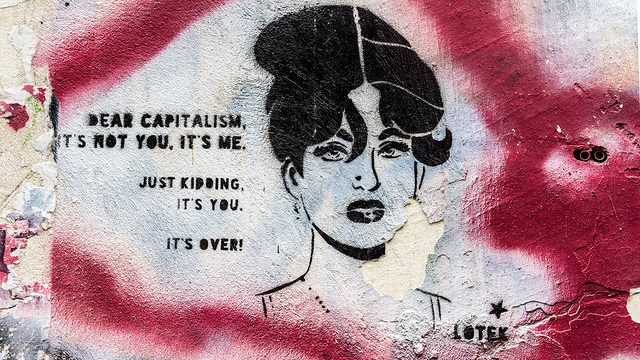
07 Feb Capitalism and What’s Important

Capitalism and What’s Important: Stenciled mural reading “Dear Capitalism and what’s important: This mural by street artist lotek is a witty reminder we have choices in systems, beliefs and priorities. The photo is by urban-museum, copyright-free on Flikr, sourced by Creative Commons search.
Capitalism and What’s Important
It’s important to distinguish between capitalism and what’s important when it comes to money. It’s vital we understand that when it comes to money–and all we have attached to it emotionally–we are not living in neutral territory. We are living in fraught cultural territory.
Money is a game. It’s like language: we humans have made up the rules. And just like language, there are many different money cultures actual and possible.
In our particular money culture, we have made up a particularly challenging game. Sometimes I think it is a masochistic game. Sometimes I think it is a cruel, vicious game. We call our money game capitalism. You might like it, you might want to like it. You might hate it or want to hate it. But this is the common name for our particular money culture.
If you are interested in alternatives, I enjoyed
- studying Gandhian economics,
- also studying Buddhist economics
- Amish economics ideas
- the book Economics as if the Earth Really Mattered by Susan Meeker-Lowry, which is old now and still great
- all sorts of reading and thinking about cooperative economics.
What Is Actually Important?
I want you to ask yourself this question. My point is not to answer it for you; this is the question we have been RAISING CLARITY about in our past few posts. Start here for some help if you like. And here’s a quick take on what I am not saying about it.
But to simplify your quest, as we discussed recently:
Most of us value safety, community, comfort, growth, health, and beauty. Even though many people do not have one or any of these things, they are vital to our wellbeing.
The fact that these things are so important and so many people do not have them makes me
- realize the money game is rigged
- rethink how more people can have what’s important to them, even when they “don’t have the money,” as we so often say.
- explore in this blog in what ways it is not at all about the money at the deepest level. For example, it may sound cynical, but it really just seems realistic to me to question how such a culture as ours would find other ways to make people feel insignificant if we didn’t use money to do it. People who want to make each other feel bad find lots of ways to do so. Likewise, we know there are lots of ways to help others feel great. So I don’t think it’s “all about the money” anymore, and I’m trying to get some clarity for myself and our readers as I blog.
Why I Don’t Like Our Current Money Game Rules
Capitalism has taught us that things vital to life and wellbeing aren’t our birthright–everyone’s birthright.
The rules of this money game is that some are valuable and others aren’t.
The valuable people get their needs met; the others don’t. It’s that simple.
Obviously, RAISING CLARITY sees this is completely false and weird. But unlike others, we refuse to condemn money, or blame money. Money is a game we can change. Like grammar, we can tacitly or explicitly decide to change the rules. Ultimately, I’m not attached to the game even being about money but I haven’t yet seen a true alternative. (I like alternative currencies and barter; they are still a form of money, though they may be a money game you personally like and that is fantastic.)
I welcome comments!
Note: If you liked this post and want to dive in deeper, I used the 12 Steps to help me heal my addiction to capitalism. The series of 12 posts is here.



No Comments